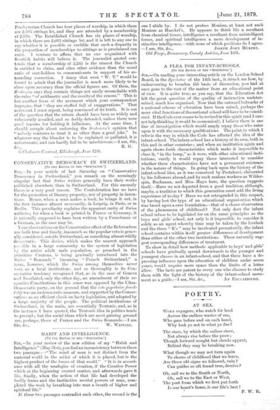A PLEA FOR INFANT-SCHOOLS.
[TO THE EDITOR OF THE SPECTATOR:1
SIR,—On reading your interesting article on the London School Board, in the Spectator of the 14th inst., it struck me how, by endeavouring to broaden the basis of discussion, you had at once gone to the root of the matter from an educational point of view. It is quite true, as you say, that the Education Act left the great question of the quality of instruction undeter- mined, much less organised.' Now that the outward bulwarks of a national scheme of education have been raised, perhaps the more vital functions of the national school will have to be consid- ered. If the Code ever comes to be revised in this spirit (and I can- not help thinking it would be economical), I believe there is one line of investigation which would amply repay those who enter upon it with the necessary qualifications. The point to which I refer is the way in which the Code has affected the idea of the infant-school. The infant-school has a history of its own, both in this and in other countries ; and when an institution again and again shows forth characteristics which make it impossible to class it, " in the lump," as it were, with other educational insti- tutions, surely it would repay those interested to consider whether these characteristics have not a permanent existence in the nature of things. In going back upon the history of the infant-school idea, as it was conceived by Pestalozzi, elaborated by his followers abroad, and by such zealous workers as Wilder- spin, Buchanan, and Miss Mayo here, the question suggests itself,—Have we not departed from a good tradition, although, maybe, a tradition to which this generation must add the living experience of to-day ? Have we not retrograded in this respect, by having lost the type of an educational organisation which was based upon a sure foundation,—that of a closer observation of the phenomena of childhood P Not only does the infant school refuse to be legislated for on the same principles as the boys and girls' school, not only is it impossible to consider it solely as an agent whereby time may be taken by the forelock and the three " R's " may be inculcated prematurely, the infant school contains within itself greater differences of development than either of the other two institutions. These naturally sug- gest corresponding differences of treatment.
To show in detail how methods applicable to boys' and girls' schools have gradually spread downwards to the younger and youngest classes in an infant-school, and that these have a de- pressing influence upon the education of children under seven years, would require more space than the limits of a letter allow. The facts are patent to every one who chooses to study them with the light of the history of the infant-school move- ment as a guide.—I am, Sir, cte., AN EDUCATIONIST.


































 Previous page
Previous page